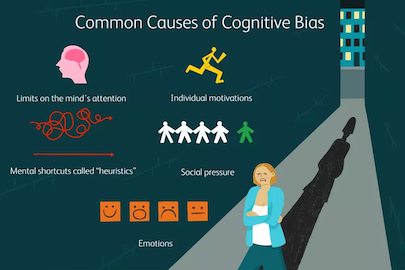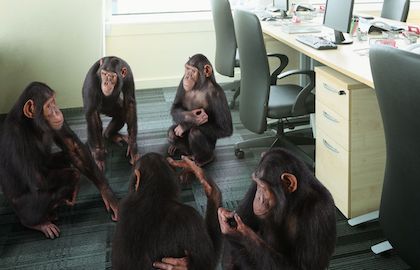Hacking an incompetent colleague
who thinks he’s brilliant.
"The Dunning-Kruger effect"
Often they aren’t aware they suffer from it, read guidelines on how to deal with the Dunning-Krugger effect

By Emmanuel Perez, aka the Talent Surgeon.
The Talent Surgeon is a contributor ghostwriter for People Place, among other well-known HR digital magazines. The Talent Surgeon gets diagnostics directly related to our day-to-day lives and he surely delivers the right antidote right in time over and over.
Why this subject.
A while ago (not being precise on purpose in order to protect the identity) I found myself in the situation of having to deal with a “popular” colleague who kept promising to plant our flag on the moon but fail already at the rocket-launch face. A “socialis papilionem” individual… the HR business partners loved her/his personality, the Hiring Managers would accept the invitation to mingle with her/him after work, and the team members… well let’s say “they couldn’t wait for the rocket to take off”… I am sure you catch my drift…
Several complaints were raised about her/him, so I needed to find the “error code” in the rocket program (I needed to find a solution) before she/he was asked to go. Also, such potential could not be wasted!
So with this article, I want to share with you what I learned back then before I took the necessary steps to address the issue.
what is the “Dunning-Kruger effect” and
how to spot it?
According to Psychology Today definition: “the Dunning-Kruger effect is a cognitive bias in which people wrongly overestimate their knowledge or ability in a specific area. This tends to occur because a lack of self-awareness prevents them from accurately assessing their own skills”. This short video will explain it simply but comprehensively:
People who fall victim to the Dunning-Kruger effect often also lack the ability to see their own errors, or be able to fix them.
It makes sense then why most of us during our lifetime have come across a university student, work colleague, friend, partner, or family member that claims to be very good at something with no previous preparation or effort before tackling something important or before an important goal in their life, yet they will fail and keep failing over and over in the very same or similar situation, still jet refuses to recognize their previous failers or been wrong in their judgment.
Other times people suffering from the Dunning-Kruger effect are easier to spot, even at a dinner table or a brief social gathering. Generally, the signs are very evident and someone begins spouting off on a topic at length, boldly proclaiming that he is correct and that everyone else’s opinion is uninformed, stupid, and just plain wrong. It’s mostly plainly evident to everyone in the room that this person has no idea what he/she is talking about, yet he/she prattles on, blithely oblivious to his own ignorance.
Such effect is named after psychologists David Dunning and Justin Kruger, from the Cornell University School of Psychology (New York), who detected this syndrome for the first time across four investigations carried out in the 1990’s.

(Their results, published in the Journal of Personality and Social Psychology, showed that the greater the incompetence of the person, the less aware they were of it. On the contrary, the most competent and skilled workers were the ones who, paradoxically, most tended to underestimate their skills).
Conclusion to the investigations.
In conclusion, their experiments and investigations came to show that the most incompetent people are also more incapable of realizing their clumsiness and tend not to be able to recognize the capabilities of others. These findings come to fit perfectly with the experience of labor psychologists who have been teaching courses for many years to develop skills such as the ability to speak in public, and have observed repeatedly and for a long time, that very commonly those who do the worst have a more self-sufficient attitude, assertiveness, arrogance, and excessive self-confidence. They don’t see that they have done it wrong, even when the mistakes are obvious, But not only that, they are also very hurtful when it comes to evaluating other colleagues who do much better than them. They are not able to see the good in others.

The Origin of The Problem.
 Cognitive biases can be caused by a number of different things: Limits on the mind’s attention, individual motivations, heuristics, social pressure, and emotions. But it is these mental shortcuts, known as heuristics, that in this particular case often play a major contributing role.
Cognitive biases can be caused by a number of different things: Limits on the mind’s attention, individual motivations, heuristics, social pressure, and emotions. But it is these mental shortcuts, known as heuristics, that in this particular case often play a major contributing role.
People who suffer from this bias find it difficult to objectively assess their abilities: their main problem is a lack of self-knowledge. They tend to have a distorted image of themselves, at the very least in the workplace. “What they perceive does not fit with what those around them see”.
Sometimes they don’t see their limitations and others don’t even want to see them. Their insecurities lead them to deny or reject things that they do not want to accept about themselves because it is painful for them (like the one who is unable to realize that he stutters when speaking in public). There is also fear of judgment by others (If I don’t say it, if I deny it, if I act as if I’m doing it right, maybe others won’t realize what I’m doing wrong) Sound familiar? Most of us had encountered the situation once or twice…
To this cocktail are added some personality traits that can also influence, such as narcissism, and self-esteem problems. It is “the whiting that bites its tail” because in order to have healthy self-esteem it is important to have an accurate image of one’s own virtues and limitations. This situation directly influences teamwork and employee performance. Workers who are unaware of their limitations tend to take on much more tasks than they can complete, also out of a need to please or feel valuable to others. They are unaware of how long it will take and are unrealistic with planning. This means that they do not perform well and that the deadlines are not met. It ends up overloading others with work, generating stress and conflict and managers should not look the other way just because he/she had a good intention. A worker with this lack of self-knowledge is extremely dangerous, much more than a demotivated person ”.
Addressing the issue at work. (and all this because of a lemon!)
Most leaders have found themselves in the position of leading someone who suffers from this difficulty, even if they are not know aware they have done. According to top Management Consultants, Forbes, and Tedx contributors (whose names I would not cite purely for rights purposes) but who have spent the past 30 years helping organizations overcome their hurdles with human resource management, it is “one of the most frequent and exhausting performance problems” they have observed in their careers.
We will probably all agree that the price of getting around this problem is high, but the reality is that if the manager doesn’t address the situation, the employee’s work won’t improve and the organization will end up losing a team member who could have prospered if given the right support.
One of the consequences of the manager not doing anything about it, is the risk that the rest of the team will think that the leader seems to tolerate poor work, and good performing employees will become demotivated at the risk of generating disengagement.
It is clear then that it has to be addressed, there are not two sides of a coin on this one, -but what are the safety guidelines? are they any for us Non-Psychology professionals?… at the time, I needed some real safety guidelines to put “the Lego space shuttle in the right orbit” to plant that flag… so I kept digging!
Finding safety guidelines to address the issue.
In my quest for the “lost Ark of the Covenant” containing the steps and guidelines, I found myself like Indiana Jones, jumping through booby-traps that gave me the following:
Managers can help by giving directions and clear feedback; although for dealing with Dunning-Kruger effect sufferers is advisable to work on the assertiveness skills to learn to communicate errors without hurting, and give “praise” with extra care, for an employee who already has an exaggerated image of his own performance, “praise” can confirm his idea that everything he/she does is excellent.
According to specialists on this topic “The ideal thing is to connect the positive comments with other things that, from the organization’s point of view, you need to try to change”. I personally think that most managers who carry out yearly performance reviews would not need “elite consulting” to work that out by themselves, but hey! we sure appreciate highlighting it on this topic, right?
Recommendations also include “evaluating that person strictly objectively and based purely on data”. Come on! –(I shout inside my head, followed by: -I am desperate out here! share something new, would you?
At this point, I couldn’t for more that I wanted to stop reading for a second and asked myself: -(are any of the management professionals out there ever done a performance review without solid data in hand?) I mean…would you, should you, could you?
Finally, after an overdose of caffeine, hoovering a bag of mini muffins, and having a sleepy leg from holding my dog on my lap in an awkward position, I hit pay dirt! So stay with me just one minute more…
The steps!
 How to start.
How to start.
First key thing is to identify the likely cause of an underperformer’s lack of self-awareness, once you have identified the cause or narrowed it down, these five approaches will help you correct the “error code” or at least find out whether that’s even possible for a non-psychology professional.
 Be kind.
Be kind.
It’s very easy to trigger defensiveness when troubleshooting the Dunning Kruger Effect, which is why it’s so important to start from a place of warmth and kindness. The person is probably doing their best, even if they don’t recognize where or why they’re falling short. In addition to being upfront about where the employee has to improve, help them see how they’ll benefit from making those improvements.
 Assess whether they’ll accept help.
Assess whether they’ll accept help.
 Show what a great performance looks like.
Show what a great performance looks like.
If you are having difficulties having the person see where they’re falling short, provide them with a challenge that will clearly expose their specific weak areas. E.g. if the team member thinks he/she is awesome at putting together business presentations, but he/she fails to notice that presentations are dull leaving everyone uninspired. Ask the team member to work on a presentation that will lead to a brainstorming session. The lack of motivation and ideas generated will give them enough reason to assess where they go it wrong.
 Provide employees with resources, support, and specific training.
Provide employees with resources, support, and specific training.
 Start slow.
Start slow.
 Keep an eye on Senior Members.
Keep an eye on Senior Members.
 Schedule continuous feedback sessions.
Schedule continuous feedback sessions.
Final thoughts on the topic.
When we face a situation of having a colleague or employee who isn’t able to see their mistakes and areas of weakness, we must start by giving them the tools and training that will lead them to appraise themselves more accurately. Calling them aside with an official verbal warning for under-performing perhaps is just not enough. Perhaps approaching the employee from the side with kindness and constructively guiding them to see the reality of their abilities, you will also help them develop skills they need, feel good about going to the office, and creates engagement.
First time on our website? don’t leave without visiting our home page, we guarantee 60 cool seconds or your money back!
 liked it? Share it!
liked it? Share it!







